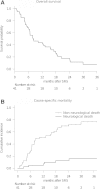Upfront stereotactic radiosurgery in patients with brain metastases from small cell lung cancer: retrospective analysis of 41 patients
- PMID: 25005424
- PMCID: PMC4099016
- DOI: 10.1186/1748-717X-9-152
Upfront stereotactic radiosurgery in patients with brain metastases from small cell lung cancer: retrospective analysis of 41 patients
Abstract
Background: Although the efficacy of prophylactic or therapeutic whole brain radiotherapy (WBRT) for brain metastases (BM) from small cell lung cancer (SCLC) is well established, the role of stereotactic radiosurgery (SRS) has yet to be determined. In the present retrospective analysis, we investigated whether upfront SRS might be an effective treatment option for patients with BM from SCLC.
Methods: We analyzed 41 consecutive patients with a limited number of BM (≤ 10) from SCLC who received SRS as the initial treatment. No prophylactic and therapeutic WBRT was given prior to SRS. The median patient age was 69 years and the median Karnofsky performance status (KPS) score was 90. Repeat SRS was given for new distant lesions detected on follow-up neuroradiological imaging, as necessary. Overall survival, neurological death, and local and distant BM recurrence rates were analyzed. The survival results were tested with three prognostic scoring systems validated for SCLC: Diagnosis-specific graded prognostic assessment (DS-GPA), Radiation therapy oncology group -recursive partitioning analysis and Rades's survival score.
Results: One- and 2-year overall survival rates were 44% and 17%, respectively. The median survival time was 8.1 months. Survival results replicated the DS-GPA (P = 0.022) and Rades's survival score (P = 0.034). On multivariate analysis, patients with high KPS (hazard ratio (HR): 0.308, P = 0.009) and post-SRS chemotherapy (HR: 0.324, P = 0.016) had better overall survival. In total, 95/121 tumors (79%) in 34 patients (83%) with sufficient radiological follow-up data were evaluated. Six- and 12-month rates of local control failure were 0% and 14%, respectively. Six- and 12-month distant BM rates were 22% and 44%, respectively. Repeat SRS, salvage WBRT and microsurgery were subsequently required in 18, 7 and one patient, respectively. Symptomatic radiation injury developed in two patients and both were treated conservatively.
Conclusions: Our survival analyses with the validated prognostic grading systems suggested upfront SRS for limited BM from SCLC to be a potential treatment option, with patient survival being slightly more than eight months after SRS. Although SRS provided durable local tumor control, repeat treatment was needed in nearly half of patients to achieve control of distant BM.
Figures




Comment in
-
Stereotactic radiosurgery alone for small cell lung cancer: a neurocognitive benefit?Radiat Oncol. 2014 Sep 30;9:218. doi: 10.1186/1748-717X-9-218. Radiat Oncol. 2014. PMID: 25333667 Free PMC article.
References
-
- Quan AL, Videtic GM, Suh JH. Brain metastases in small cell lung cancer. Oncology. 2004;18:961–972. discussion 974, 979-980, 987. - PubMed
-
- Castrucci WA, Knisely JP. An update on the treatment of CNS metastases in small cell lung cancer. Cancer J. 2008;14:138–146. - PubMed
-
- Arriagada R, Le Chevalier T, Borie F, Riviere A, Chomy P, Monnet I, Tardivon A, Viader F, Tarayre M, Benhamou S. Prophylactic cranial irradiation for patients with small-cell lung cancer in complete remission. J Natl Cancer Inst. 1995;87:183–190. - PubMed
-
- Auperin A, Arriagada R, Pignon JP, Le Pechoux C, Gregor A, Stephens RJ, Kristjansen PE, Johnson BE, Ueoka H, Wagner H, Aisner J. Prophylactic cranial irradiation for patients with small-cell lung cancer in complete remission. Prophylactic Cranial Irradiation Overview Collaborative Group. N Engl J Med. 1999;341:476–484. - PubMed
-
- D'Ambrosio DJ, Cohen RB, Glass J, Konski A, Buyyounouski MK, Feigenberg SJ. Unexpected dementia following prophylactic cranial irradiation for small cell lung cancer: case report. J Neurooncol. 2007;85:77–79. - PubMed
MeSH terms
LinkOut - more resources
Full Text Sources
Other Literature Sources
Medical

